- Details
MNR Report
Join the Michigan DNR for Hunter Safety Education Week, Aug. 11-17, offering in-person opportunities for more than 2,000 students to obtain a hunter safety education certificate.
More than 40 additional class locations statewide will be posted and available for registration starting Monday, July 7.
To purchase a hunting license in Michigan, anyone born on or after Jan. 1, 1960, is required to successfully complete an approved hunter education course.
Hunter safety education classes are commonly offered in the spring, ahead of spring turkey season, or in the fall, before the firearm deer season. These Hunter Safety Education Week classes – more than 50 in all – are offered in addition to the already planned fall classes.
“Just like preparing for school and fall extracurriculars, hunting season needs to be considered in advance,” said Lt. Tom Wanless, DNR recreational safety, education and enforcement supervisor.
“A lot of people aren’t thinking about hunting season right now because it’s the middle of summer. We don’t want to see everyone wait until the week before they want to hunt to try locating a class, at which point classes are often full,” he said. “We hope that by offering an influx of classes during a set week each year, more people will have enough notice to prepare for hunting season.”
There are four options for completing hunter safety education in Michigan, all of which require at least four hours of in-person instruction:
- Traditional classroom-based course.
- Online course followed by an in-person field day.
- Interactive online course followed by an in-person field day.
- Take-home study course followed by an in-person field day.
Hunter safety education helps the next generation of hunters learn how to safely and responsibly enjoy hunting and understand the importance of wildlife management. The DNR-managed program teaches lifelong skills, such as firearm safety, basic first aid and how to use a map and compass, to an average of 14,000 students per year.
Learn more or register for a class at Michigan.gov/HunterEducation.
Additionally, the DNR is always looking for voluntee
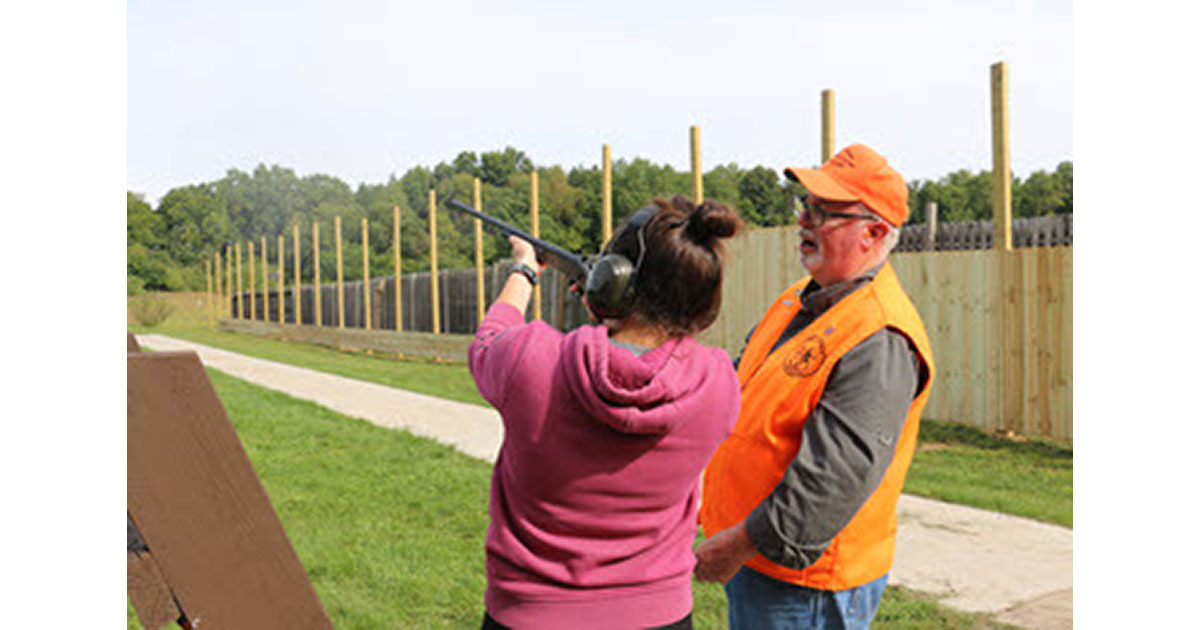
r recreational safety education instructors. If you’re interested in sharing your outdoor experience and safety smarts with those newer to the outdoors, get details on the DNR website.
- Details
MDNR Report
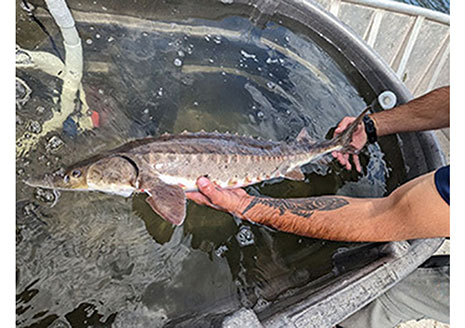
The Little Traverse Bay Bands of Odawa Indians, along with the Michigan DNR, Bay Mills Indian Community and Michigan State University, will be conducting a lake sturgeon survey next month on Burt Lake in Cheboygan County. The goal of the survey is to determine the lake sturgeon population status and the success of stocking efforts. Lake sturgeon is a culturally and ecologically significant species in Michigan, and tribal governments and the State of Michigan cooperatively manage and assess sturgeon populations.
The survey will occur from July 7 to July 25, with nets set Monday through Thursday of each week. Survey gill nets will be used to capture lake sturgeon, and staff will check the nets regularly (every one to two hours) during the day. Nets will be set each day and marked with staff buoys (see image, right), then removed at the end of the day and will not be left in the lake overnight.
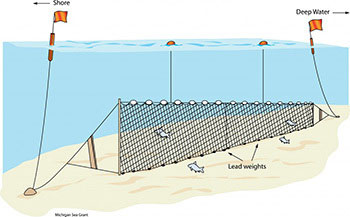 Sturgeon Gill Net
Sturgeon Gill Net
Once captured, lake sturgeon will be measured and tagged with a passive integrated transponder, or PIT, tag (if the fish has not already been tagged). The PIT tags allow staff to uniquely identify individual fish when they are recaptured and provide data needed to calculate a population estimate. Some lake sturgeon smaller than 40 inches will have a small portion of a fin removed for aging. This will allow staff to evaluate growth of both stocked and naturally produced lake sturgeon in Burt Lake. Surveys following the same protocol were recently conducted on Black Lake (2023) and Mullett Lake (2024) to evaluate stocking efforts.
Please be on the lookout for survey buoys and avoid them while boating on Burt Lake this July. If you have questions about the survey, please contact Dylan Jones (djones@ltbbodawa-nsn.gov), Neal Godby (GodbyN@Michigan.gov), Emily Martin (MartinE13@michigan.gov), or Frank Zomer (fzomer@baymills.org).
For more information about lake sturgeon assessments, visit Michigan.gov/DNR/Managing-Resources/Fisheries/Tribal/Inland/Sturgeon. You can also learn more about lake sturgeon at Michigan.gov/Sturgeon.
- Details
MDNR Report
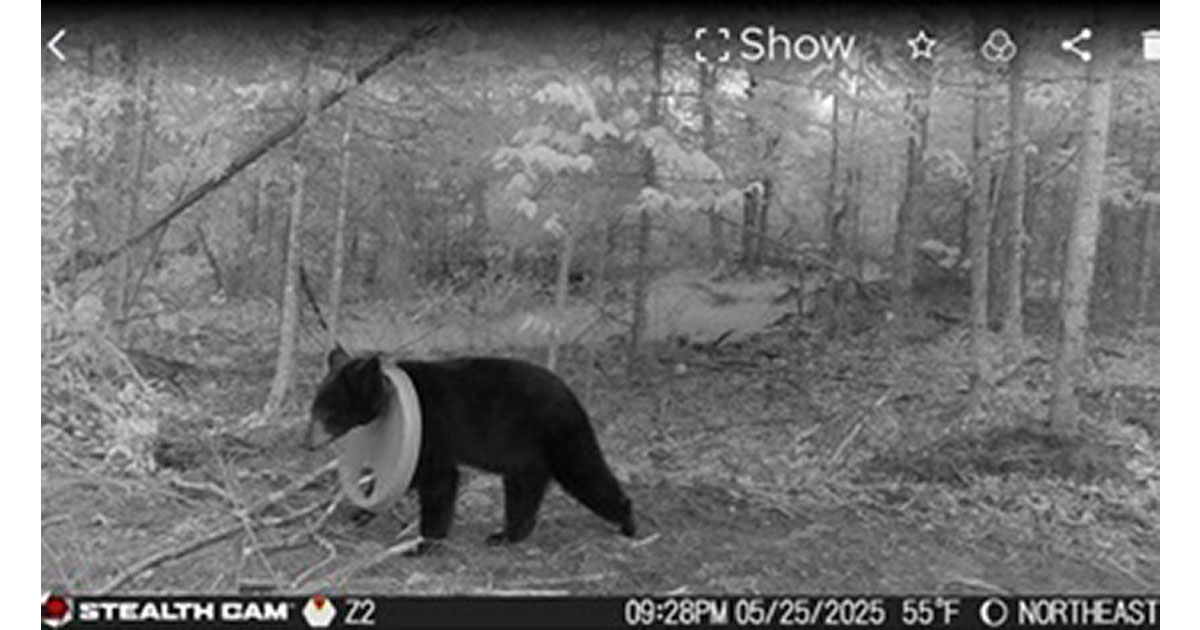
In a case that highlights the importance of Michigan’s bear-baiting regulations, state wildlife biologists in Montmorency County recently removed a plastic lid from the neck of a young black bear that had carried the encumbrance around for two years.
It isn’t known exactly where or how the male bear got its head stuck in a 5-inch hole in the lid. The blue plastic lid is similar to those that fit 55-gallon drums used by hunters to bait bear and by landowners to store materials that can attract bears, such as chicken feed.
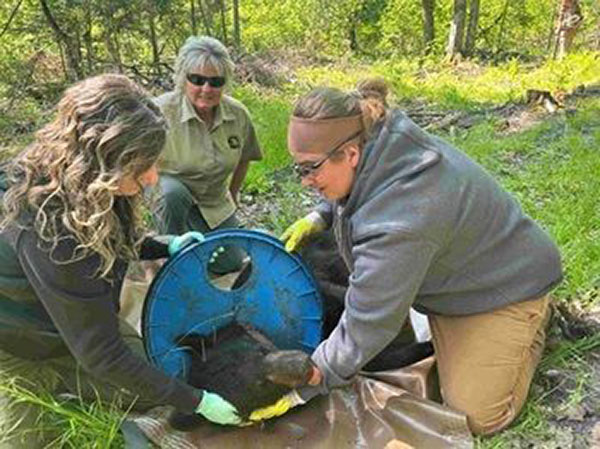
Biologists at the DNR’s Atlanta field office became aware of the bear in 2023 after seeing trail camera photos of the then-cub with its head stuck in the lid. The bear would prove elusive over the next two years, occasionally appearing on other trail camera photos but then disappearing after a day or so.
Then, in late May, a Hillman resident spotted the bear in trail camera photos taken on his wooded acreage and alerted the DNR. With the landowner’s permission, state biologists set up a baited enclosure trap and caught the animal safely on June 2. After anesthetizing the bear, they cut the lid off its neck and collected body measurements and other data.
The bear weighed 110 pounds, which is fairly standard for a 2-year-old bear that’s still growing. It had significant scarring and an abscess on its neck but otherwise seemed healthy. Once the anesthesia wore off, the bear was released back onto the property.
Norton said the trapping, chemical immobilizing and data-collecting effort provided DNR staff with valuable training and information that can inform future research and bear-management strategies. Michigan is home to about 13,000 black bears – 1,700 of them in the northern Lower Peninsula.
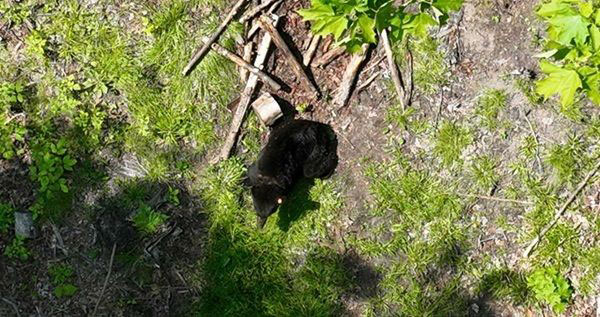
While baiting is a legal method for hunting bears in Michigan, bait containers can only be used on private land and may only have holes that are either 1 inch or less in diameter or 22 inches or greater in diameter.
Landowners can do their part by recycling or crushing containers such as empty cheeseball tubs and being “BearWise” about securing garbage, said Cody Norton of the Michigan Department of Natural Resources. He pointed to cases in Florida, Wisconsin and Tennessee in which bears got their heads stuck in food containers.
“Container openings of a certain size can result in bears and other wildlife getting their heads or other body parts stuck in them, leading to injury or death,” said Norton, the DNR’s bear, furbearer and small game specialist. “It’s important to remember that the opening diameter is more important than the size of the container.”
To learn more about living with black bears and minimizing bear encounters, visit BearWise.
- Details
MDNR Report
The Michigan DNR encourages everyone to take advantage of “Three Free” Weekend – Saturday, June 7, and Sunday, June 8.
Indiana also will offer free fishing, but only for Indiana residents. Michigan allows non-residents to fish for free.
It's two full days when Michigan residents and out-of-state visitors can grab a fishing rod, ride the off-road trails and visit state parks, boating access sites and other outdoor locations — all free of charge.
“If you need another reason to get outdoors and explore some of Michigan’s best recreation opportunities, ‘Three Free’ Weekend is it,” said DNR Director Scott Bowen. “There’s nothing better than spending time outdoors with friends and family in places you love, so we’re encouraging everyone to take advantage of these two days to fish, hit the ORV trails and visit our award-winning state parks.”
- Details
MDNR Report
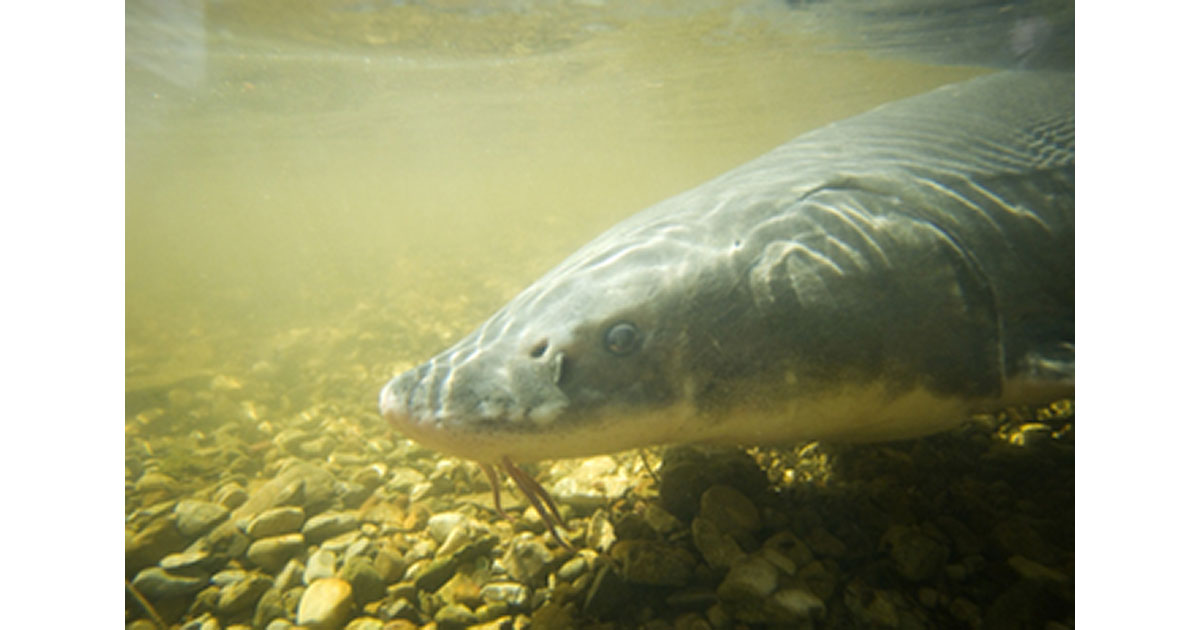
As spring arrives, anglers fishing in our rivers may unexpectedly find themselves with a lake sturgeon on the line. The Michigan DNR reminds anglers that special regulations exist for lake sturgeon, and fishing for lake sturgeon is prohibited except in a few locations in the state.
Can anglers fish for lake sturgeon?
In the Lower Peninsula, lake sturgeon may be encountered in places such as Manistee Lake, the Manistee River, Muskegon Lake, the Muskegon River, the Grand River, the Kalamazoo River, and Saginaw Bay and its tributaries, but it is unlawful to fish for lake sturgeon in these waters; any lake sturgeon incidentally caught while targeting other species must immediately be released. Additionally:
- Never hold a sturgeon in a vertical position by its head, gill covers or tail.
- Never touch the fish’s eyes or gills.
- Handle the fish as little as possible.
Waters with sturgeon possession seasons include Lake St. Clair and the St. Clair River, Otsego Lake, the Menominee River and Black Lake. Waters with sturgeon fishing seasons (catch-and-release only) include the Detroit River, the St Marys River, Portage-Torch Lakes and the Ontonagon River.
In all other waters in the state of Michigan, it is unlawful to fish for lake sturgeon. (See Page 15 of the 2025 Michigan Fishing Regulations for detailed information related to lake sturgeon.)
Anglers can report incidental (unintentional) capture of lake sturgeon and report illegal harvesting or targeting of lake sturgeon at Michigan.gov/EyesInTheField or by calling the DNR’s Report All Poaching hotline: 800-292-7800.


